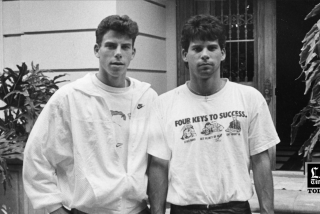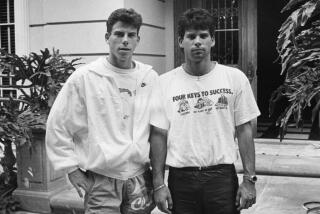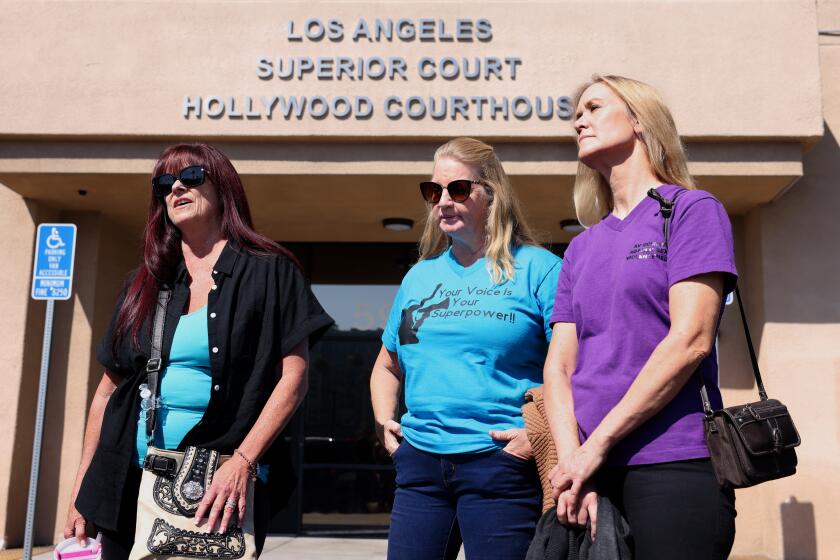Arrests Show Decline After King Beating
Arrests citywide for nonviolent crimes during the three months after the police beating of motorist Rodney G. King are down 21% over the same period last year, according to Los Angeles Police Department statistics.
While arrests for violent crimes such as murder, rape and robbery have remained relatively constant, the numbers show arrests on so-called “Part II” crimes--which include disorderly conduct, narcotics violations, prostitution and other generally nonviolent crimes--dropped by more than 13,000 during March, April and May of this year compared to 1990.
Police officials say they are aware of the downward trend, but have no explanation for it. “We have swings in crime statistics, we have swings in arrest statistics and I’d be very suspicious of any explanation that purports to be definitive,” said Lt. Fred Nixon, the department spokesman.
However, at least one city prosecutor said he noticed a drop-off in misdemeanor cases almost immediately after the King beating. Some officers have said privately that they have become less aggressive on the street, and are no longer going out of their way to stop possible suspects for fear of becoming involved in confrontations that might lead to lawsuits or personnel complaints.
“You’ve got to ask yourself, is it worth it?” said one veteran officer in the Police Department’s West Valley Division. “I got a wife and kids and a house I’m paying for. . . . A lot of the officers, good policemen, are taking the attitude that ‘I will just follow the radio, go around from radio call to radio call.’ They’ll say, ‘Hey, I saw these (suspects), it could have been a good stop a few months ago. But not now.’ ”
Figures provided by the department show that during the three months after the King beating, the department made more than 48,600 Part II arrests. In that period last year, the department made nearly 61,800 Part II arrests.
Arrests for Part I violent crimes have barely fluctuated during those three months, hovering at an average of about 5,750 a month this year and 6,000 a month last year.
According to Sgt. Len Hundshamer of the department’s Office of Operations, it is impossible to determine if the King beating has had any effect on the numbers. He said a variety of factors may cause arrest rates to fluctuate, including jail overcrowding and changing political priorities that affect the way police are deployed.
But the March 3 beating of King, which has spawned at least two investigations of the Police Department, the indictment of four officers, political upheaval in Los Angeles and nationwide outrage over police brutality, has had an undisputed impact on rank-and-file officers, according to Eric Rose, one of the founders of a Police Department support group.
“The officer on the street is being deluged by negative media coverage since the Rodney King incident,” Rose said. “Officers are becoming much more discretionary in how they approach their jobs. . . . They are not doing as much pro-active police work as they normally would, and it is based in part on people looking at their every move under a microscope.”
In Hollywood, the daytime watch commander said his station has been inundated with so many citizens’ complaints in recent months that he has felt compelled to frequently remind his patrol officers not to slack off.
“The officers are basically a little apprehensive,” said Sgt. Roger Jackson. “I tell my guys before they hit the streets to continue your job and go out as you’ve been taught, don’t just sit back and react to radio calls.”
Yet, this week, an official of the Los Angeles Police Protective League urged officers to do just that. Complaining of “uncontrollable police bashing,” Cliff Ruff, the league’s director of legal affairs, advised the rank and file to be less aggressive on the streets to protect their careers.
The league’s president, Lt. George Aliano, has distanced himself from Ruff’s statements, saying he disagrees with Ruff and would not encourage officers to hold back from making arrests. But Aliano acknowledged that the intense scrutiny since the King beating has made many officers “more sensitive,” and perhaps hesitant to risk confrontations.
Moreover, Deputy City Atty. Dave Knokey said misdemeanor cases in the San Fernando Valley area dropped within two weeks of the King beating. “There are less arrests and less cases presented to us for filing,” he said. “Some of the police seem to be in a more reactive mood.”
LAPD Arrests
The following is a comparison of Los Angeles Police Department adult and juvenile arrest figures for the first five months of 1990 and 1991. Part I crimes, which are generally violent, include homicide, rape, robbery and assault with a deadly weapon. Part II crimes, generally nonviolent, include disorderly conduct, prostitution, possession of weapons, driving while intoxicated and narcotics violations. 1990 January Part I: 5,900 Part II: 21,111 February Part I: 5,272 Part II: 18,450 March Part I: 6,154 Part II: 20,096 Apri:l Part I: 5,804 Part II: 19,541 May Part I: 6,133 Part II: 22,160
1991 January Part I: 5,931 Part II: 18,470 February Part I: 5,508 Part II: 17,006 March Part I: 5,771 Part II: 16,546 April Part I: 5,749 Part II: 15,994 May Part I: 5,711 Part II: 16,117
SOURCE: Los Angeles Police Department
More to Read
Sign up for Essential California
The most important California stories and recommendations in your inbox every morning.
You may occasionally receive promotional content from the Los Angeles Times.









